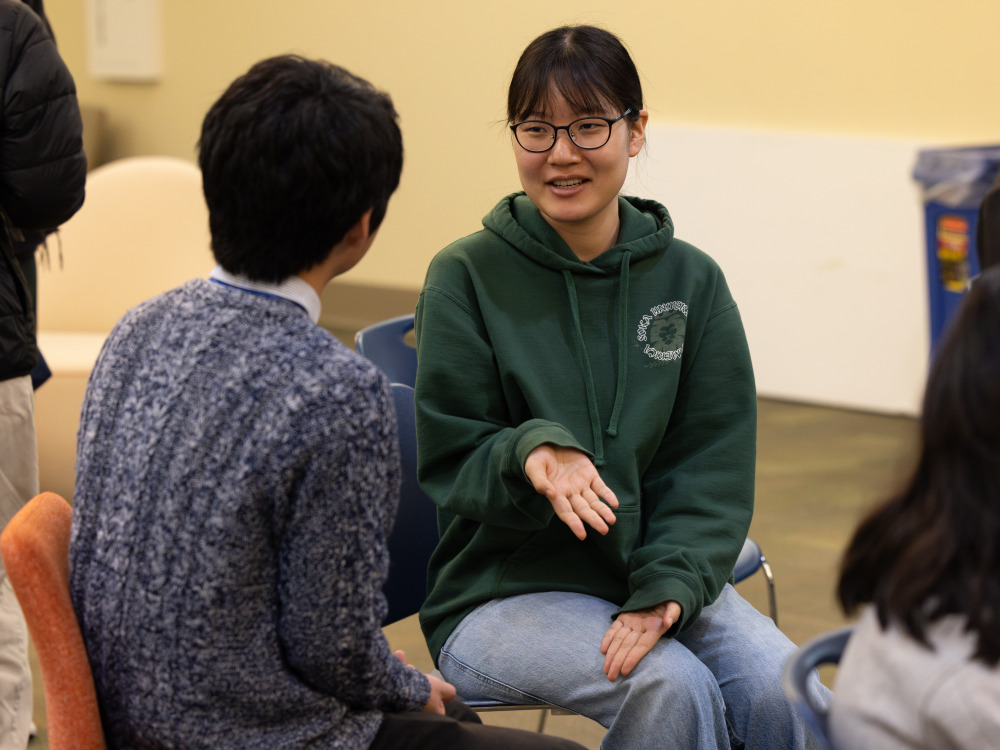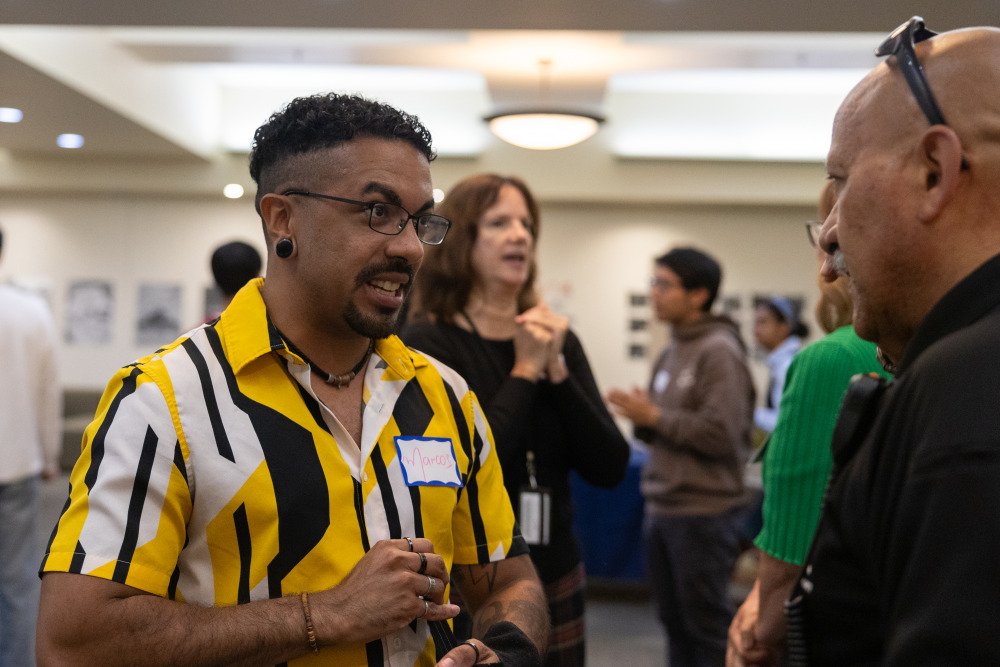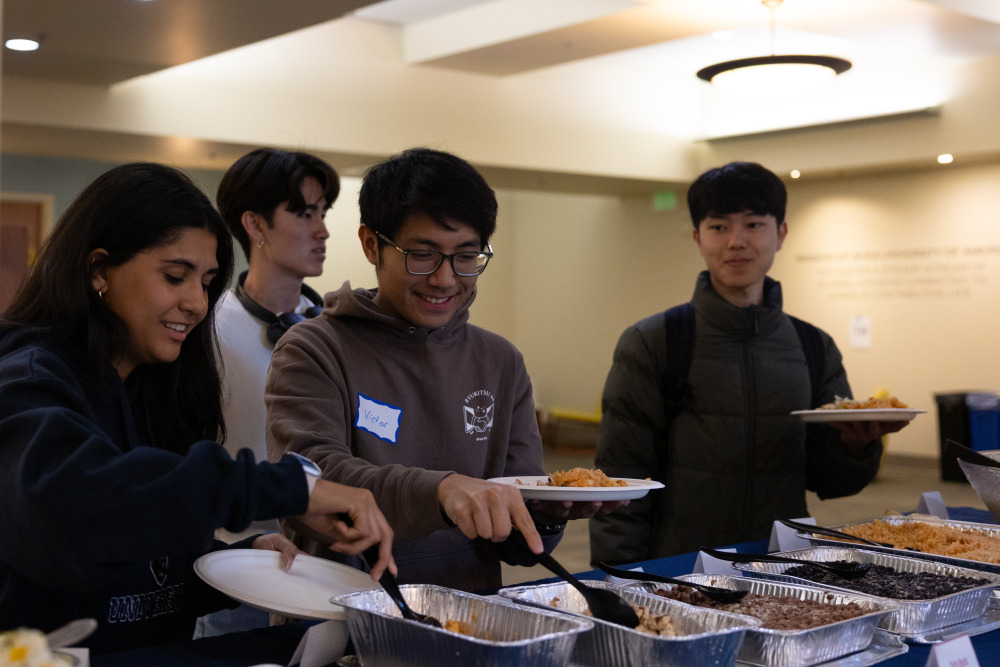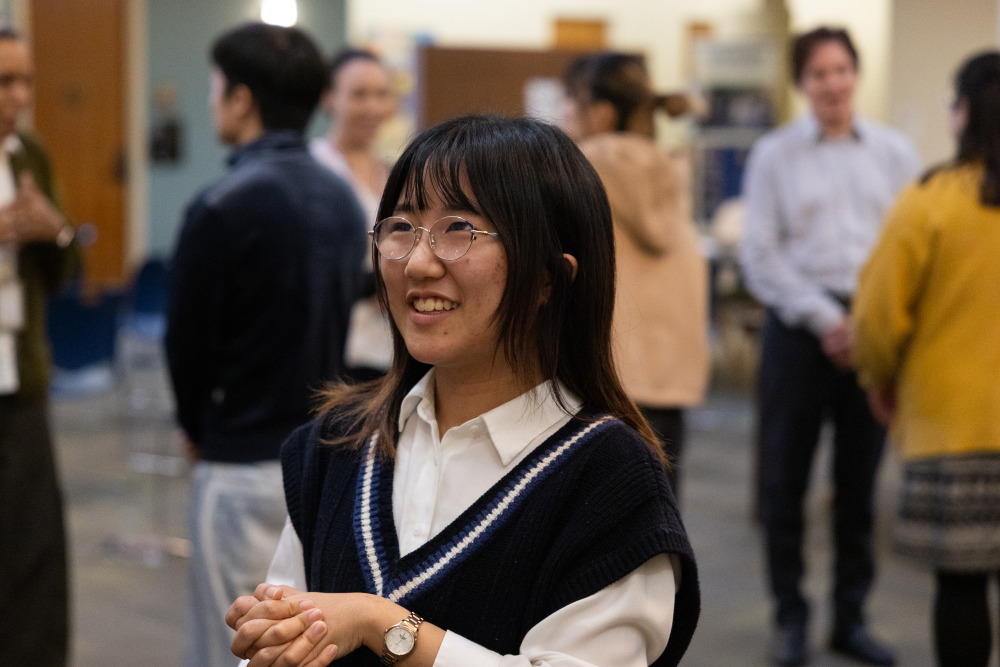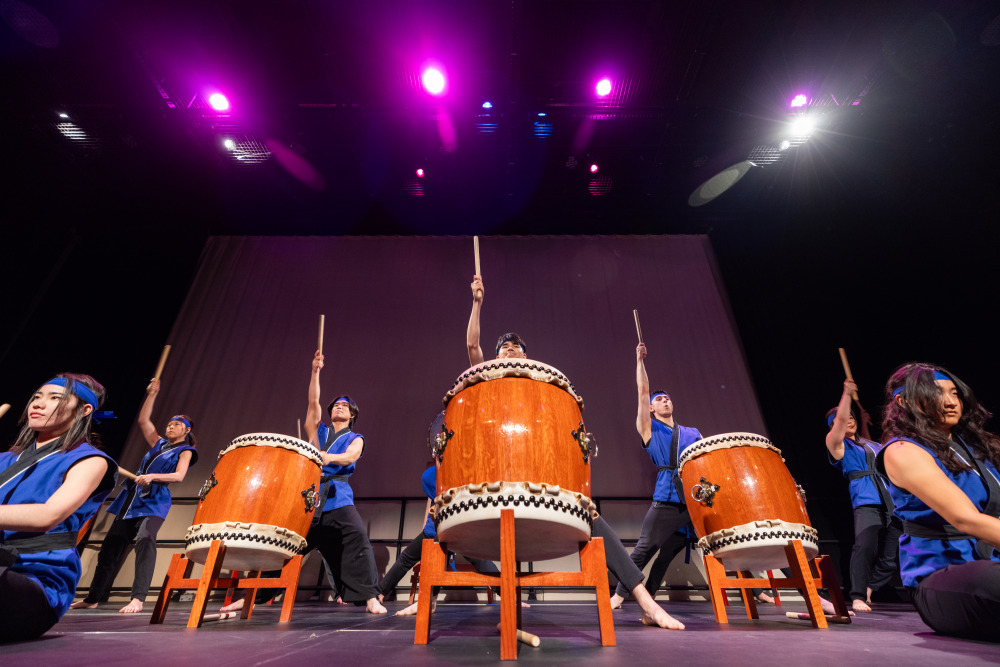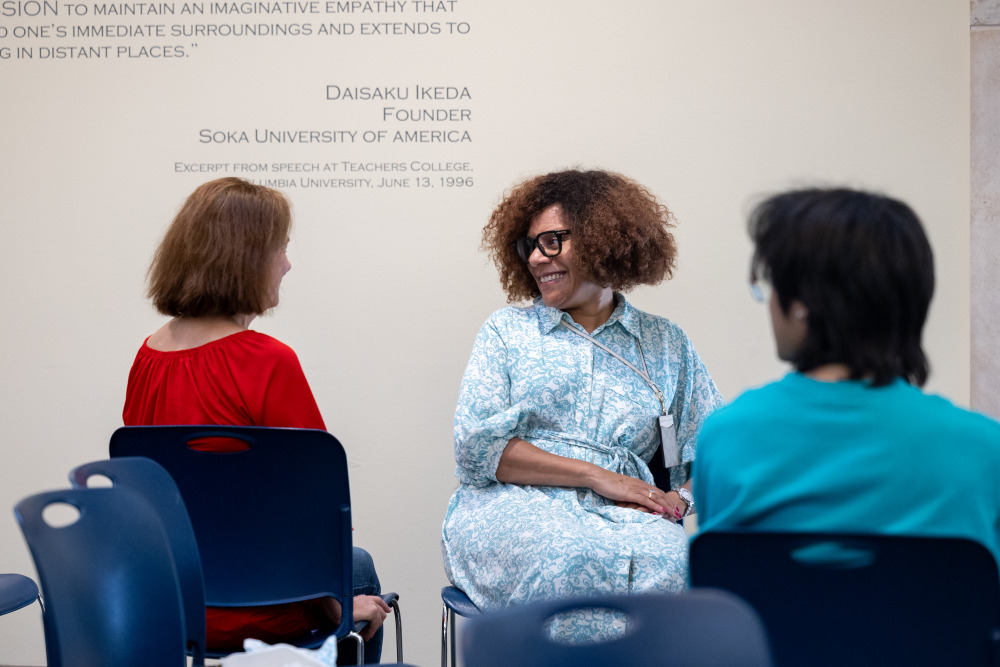Lunchtime Event Series Builds Community, Brings Founding Values Into Focus
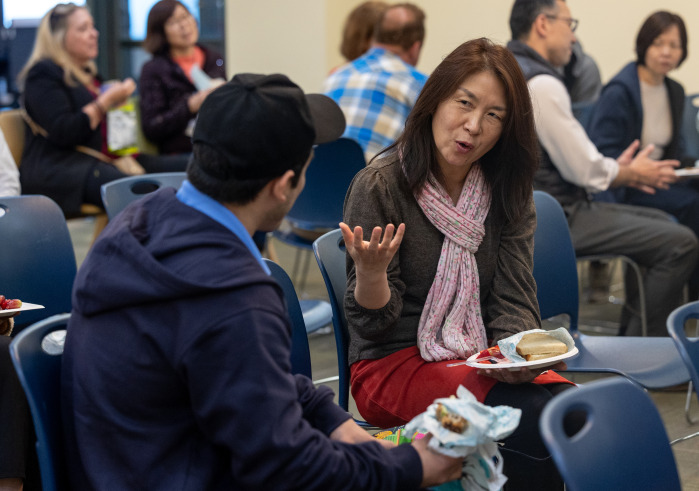
“What does it look like for us to collectively thrive?”
Maya Gunaseharan M.A. ’19, director for diversity initiatives and community building, posed this question to students, faculty, and staff gathered in the Student Affairs lobby on October 17. Her question guided the first installment of “Belonging + Becoming Through Wisdom, Courage, and Compassion,” a three-part series that brings SUA community members together over a complimentary lunch to discuss the university’s founding values. Last month’s event focused on wisdom and marked the third academic year that the Office of Diversity, Equity, and Inclusion has hosted this series.
Since the series launched in the spring semester of 2024, one of the main goals has been to explore intersections between diversity, equity, and inclusion and the three attributes of a global citizen — wisdom, courage, and compassion — that SUA founder Daisaku Ikeda outlined in the speech he delivered at Teachers College, Columbia University, in 1996. The event series was inspired by feedback that the DEI office had received from students, who felt the need for programming that would help them connect SUA’s founding values to their daily lives.
“We were hearing that sometimes wisdom, courage, and compassion can feel like distant ideals or concepts,” Gunaseharan explained. “Without articulating what they mean for us and how to put them into practice, there can be a gap in understanding. So we wanted to bring these attributes of a global citizen into our realities as a community and explore how they can support our office’s efforts to create real spaces of belonging.”
The series also aims to help address the evolving needs of the campus community as students face different challenges throughout their undergraduate careers. DEI office student employees plan each of the three events, crafting activities and topics of discussion that will resonate with their peers and the broader SUA community. Ren Nakagome ’26 of Osaka, Japan, who co-organized the most recent event with Gunaseharan, examined how wisdom can enrich participants’ understanding of friendship and boost collective well-being.
“I’m a senior here at SUA,” Nakagome said, “and throughout my college life, I’ve learned that real friendship means that sometimes we have tough conversations. It’s not just about spending time together and being there for each other, but wanting to grow together with this person.”
Another major motivation behind this event series is to provide more opportunities for students, faculty, and staff to connect in authentic ways across differences in age, background, and job title.
While this may seem like a simple goal, the impact of these human connections is profound, Gunaseharan said. She referenced a letter Ikeda wrote to students in January 2004, in which he envisioned SUA as “a microcosm of a future world in which outstanding intellects from many different cultural backgrounds will gather in friendship and harmonious coexistence.”
“That doesn’t happen automatically,” Gunaseharan said. “We have to be intentional about connecting with one another and supporting one another. And when we have those connections as our baseline, it makes it easier to navigate times of conflict.”
Notably, students see faculty and staff participation as essential to this event series.
“That’s the reason we do this event at lunchtime,” Nakagome said, stressing that the DEI team purposefully chose a time when most faculty and staff are on campus. He thinks it’s important for faculty and staff to see the human impact of their work by connecting with students, and for students to get to know the people who make their college experience possible.
Marcos Reginaldo de Souza M.A. ’26 of São Paulo, Brazil, agrees, adding that while students typically spend two to four years at Soka, faculty and staff can shape campus culture over a longer period of time.
“The university is not made only by the students,” said Reginaldo de Souza, who led the event on wisdom and oversaw the entire series last academic year. “Every position is equally important.”
Finding “Things We Are Already Sharing”: Community Growth in Practice
Because wisdom, courage, and compassion can feel like vast topics to tackle during a short lunchtime session, for the last two years event organizers chose a theme that gives participants a more focused lens for exploring these ideas. Last academic year, Reginaldo de Souza chose the theme “The Art of Connection,” which was inspired by research on the art of listening published by the Ikeda Center for Peace, Learning, and Dialogue. This year, Gunaseharan and DEI program coordinator Kaitlyn Bourdelais created the theme “Belonging + Becoming” to highlight the importance of community care, not only during the intense years of growth that students experience in college, but throughout every community member’s personal development.
“Some might think that students are the ones in a process of becoming,” Gunaseharan said, “but as faculty and staff supporting them, we too must be agile and humble enough to grow alongside them. We are all becoming together.”
As participants entered last month’s event on wisdom, they were asked to fill out a slip of paper completing the prompt, “If it weren’t for _______, I wouldn’t be here today.” Participants then hung these papers near the entrance of the Student Affairs lobby, making a patchwork of personal stories that often overlapped in their gratitude to parents, teachers, friends, and role models.
After opening remarks from Gunaseharan and Nakagome, participants launched into a “speed-connecting” icebreaker activity that gave rotating pairs three minutes to discuss questions like, “When have you been changed by someone you barely know?” or “What’s a feeling or experience you thought was unique to you, but later realized was universal?” The event culminated in small group dialogue sessions in which participants dove into a list of questions designed to help them discover common ground.
“Ikeda said that one of the essential elements of global citizenship is the wisdom to perceive the interconnectedness of all life,” Nakagome said, noting that “perceive” implies that deep connections between individuals already exist. “From there, I thought, do we really perceive the connections we already have? So I made the purpose of this dialogue activity to find, not create, things we are already sharing.”
In groups of three or four, participants discussed questions like, “Was there an object, place, game, or experience that you cherished as a child, and why?” or “Do you have any personal values that are ‘non-negotiable,’ meaning you can never compromise on them? If so, why?” In Nakagome’s dialogue group, participants discussed the question, “In what kind of situation do you feel safe or comfortable, and do you have an example?”
“One of my peers had a follow-up question,” Nakagome said. “He asked, ‘What does it mean to feel safe or comfortable?’ So we thought about it. And we ended up sharing the same thing — that feeling safe means we’re not scared of being judged … It is not reasonable to ask others not to judge us while we judge others. So in the end, it’s really about how we project ourselves in a community.”
Collaborations Open More Pathways For Connection
The event series has led to meaningful collaborations between the DEI office and other areas and student organizations. Last April, the Josho Daiko student club gave an energizing taiko performance in the Black Box Theater as part of the event focusing on courage. At the session on compassion last May, a panel of students from diverse religious backgrounds discussed how each of their faiths understands compassion, sparking interfaith dialogue.
And at the Spring 2025 event on wisdom, Reginaldo de Souza collaborated with the Writings of Daisaku Ikeda Club. As a master’s student in educational leadership, Reginaldo de Souza was learning about Paulo Freire in class, and he decided to build the session around both Freire’s and Ikeda’s ideas about dialogue. After delivering a presentation alongside two club officers, Reginaldo de Souza facilitated an activity based on the art of listening. Participants sat in pairs and responded to the prompt, “Why do you do what you do?” One partner would respond to the question for three minutes while the other listened without speaking.
“They could react, but they couldn’t say anything,” Reginaldo de Souza explained. “The purpose was to just hold space for the other person to share.”
Participants later reported that this activity helped them not only listen more attentively, but also authentically connect with their partner in a short amount of time. Reginaldo de Souza shared his personal story when modeling the activity, which also allowed participants to feel comfortable sharing personal reflections.
“According to the feedback, being vulnerable myself allowed other people to go deep and be vulnerable as well,” Reginaldo de Souza said.
The DEI office plans to collaborate with other departments and student clubs at future “Belonging + Becoming” sessions this academic year, with the goal of continuing to create events that feel relevant to the campus community.
“I’m convinced that these are experiences that can be formative for people in every corner of the university,” Gunaseharan said. She hopes students, faculty, and staff will continue participating in this series, forging friendships and contributing their unique perspectives on wisdom, courage, and compassion.
“It’s a privilege to create spaces for connections to form and deepen,” she said. “I appreciate the people who trust us and come to the space. It can’t happen without them.”

